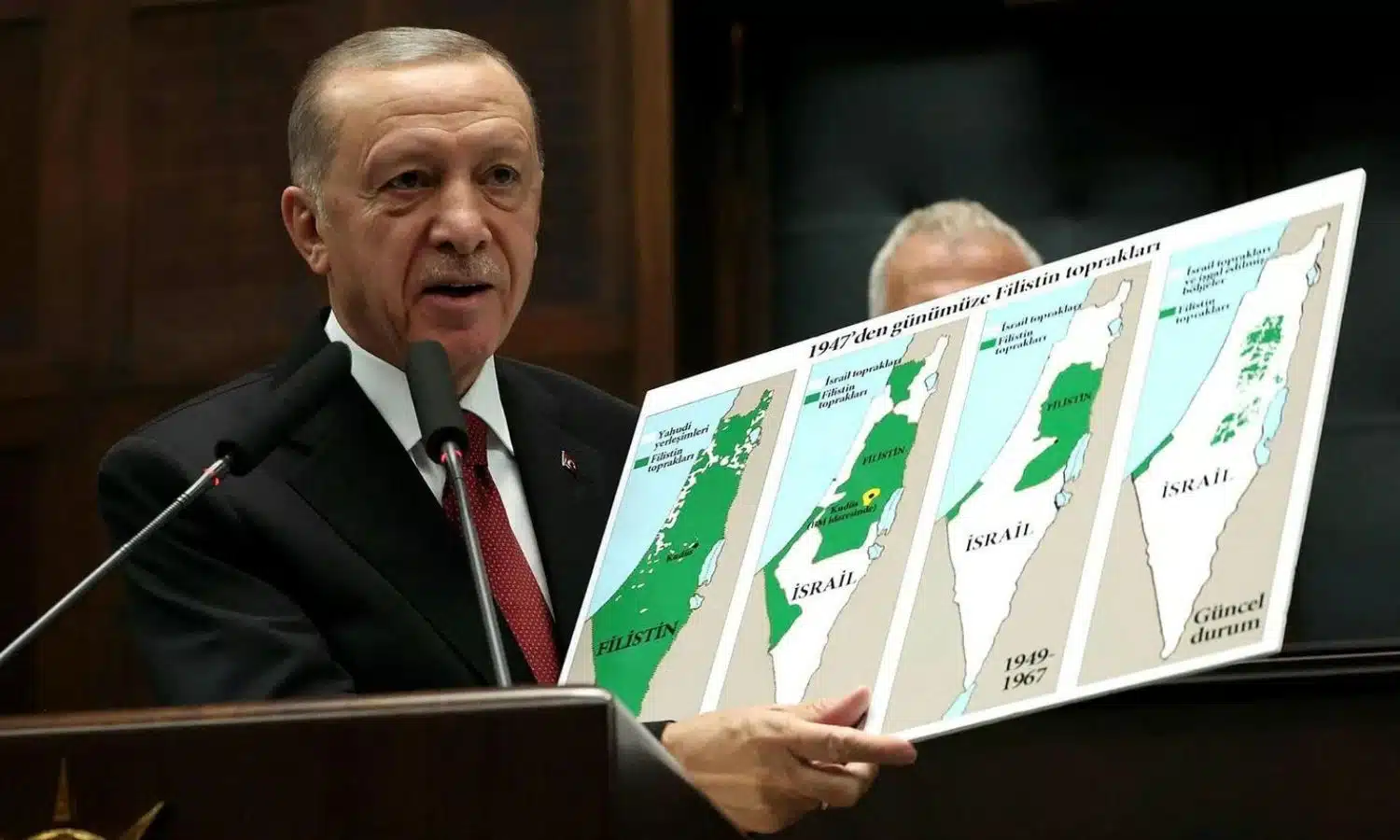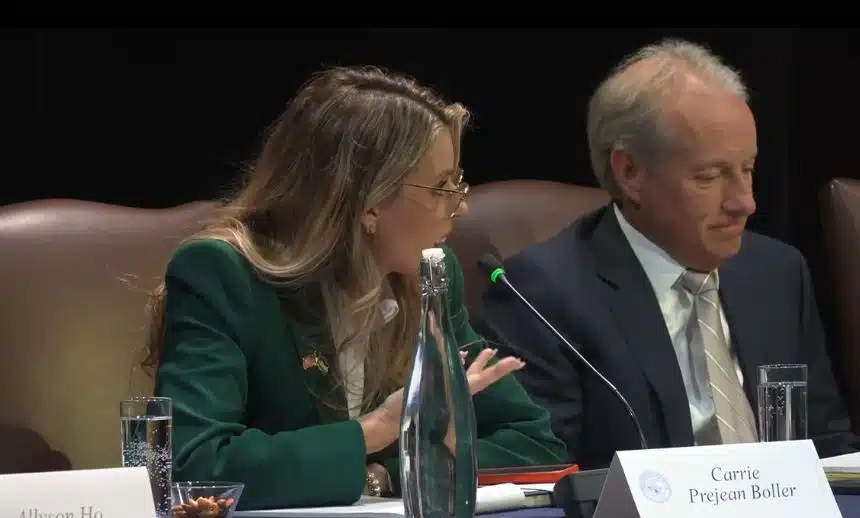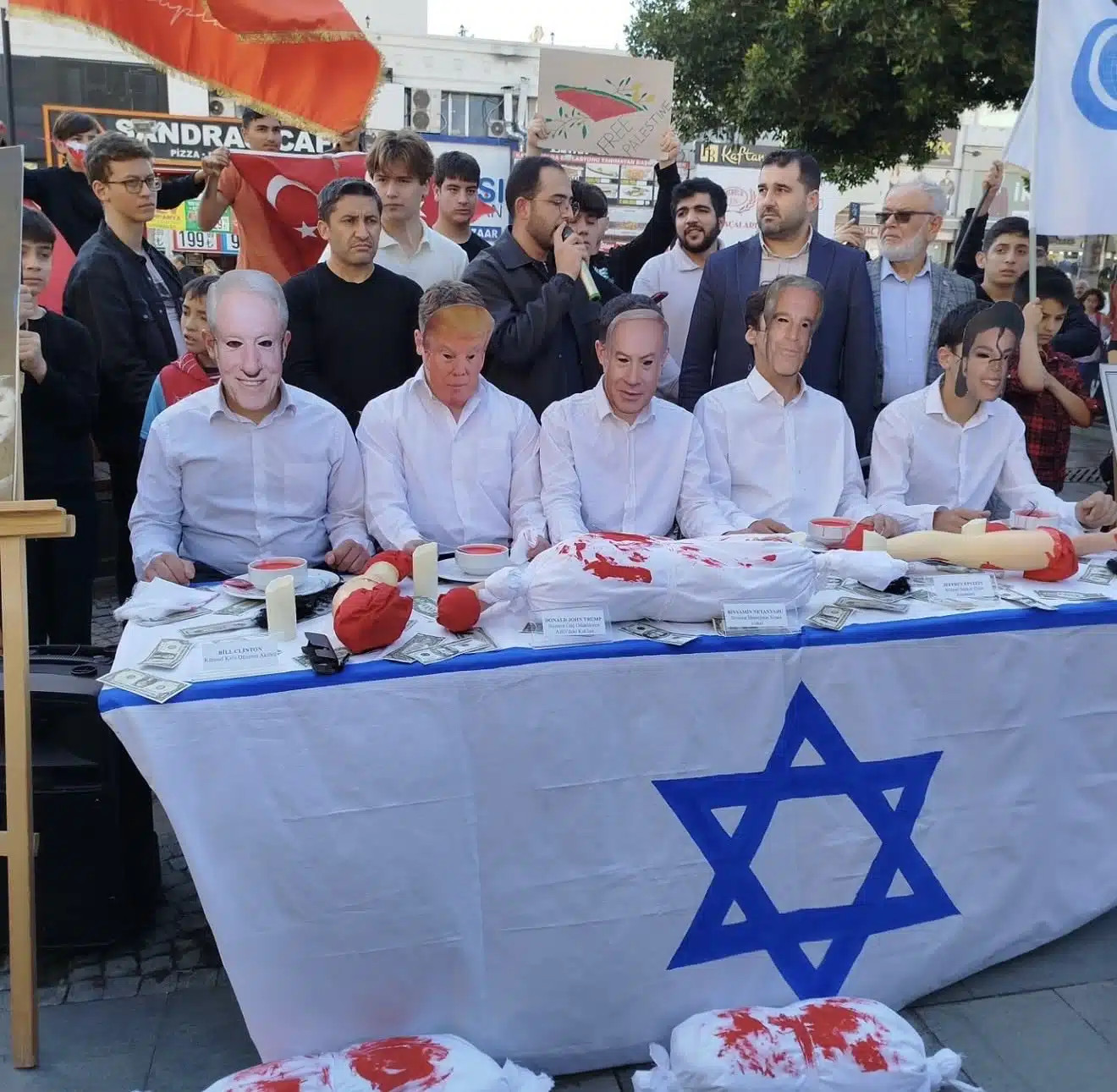|
Getting your Trinity Audio player ready...
|
The recent escalation of antisemitism in Turkey, triggered by Hamas’ October 7th attack on Israel, has caused a rapid deterioration of the country’s ties with the Jewish state, disrupting a long reconciliation process that had been playing out between the Eastern Mediterranean neighbors over the past decade.
The Combat Antisemitism Movement’s Antisemitism Research Center (ARC) has detected and monitored a significant increase in antisemitic incidents in Turkey over the past three months since Hamas brutally massacred 1,200 Israeli men, women, and children and kidnapped 240 more.
Israel and Turkey — home today to a Jewish community of around 15,000 people — first established official diplomatic relations in 1949, shortly after Israel’s founding, and the bilateral ties experienced many ups and downs in the seven decades that followed. They hit a particularly low nadir in 2010 after the Gaza flotilla incident, when Israel intercepted a Turkish ship, the Mavi Marmara, to prevent it from breaching the naval blockade of the Hamas-ruled Gaza Strip. Ten rioters were killed when they violently attacked Israeli naval commandos who boarded the ship.
After several years of tensions, Israel and Turkey agreed in 2016 to unfreeze diplomatic relations, and cooperation between the countries began to improve again. In 2022, then-Israeli Prime Minister Yair Lapid met with Turkish President Recep Tayyip Erdoğan on the sidelines of the UN General Assembly in New York City, as did current Israeli Prime Minister Benjamin Netanyahu this past September.
However, the upward trajectory of Israel-Turkey ties came to a dramatic halt on Oct. 7, when Hamas — which Turkey, under Erdoğan’s rule, has provided significant diplomatic, financial, logistical, and material support to — invaded southern Israel.
Addressing a meeting of his Justice and Development (AK) Party in parliament on Oct. 25, Erdoğan asserted, “Hamas is not a terrorist organization, it is a group of mujaheddin defending their lands.”
Following this comment, Israel withdrew its diplomats from Turkey to “reassess relations.”
This did not deter Erdoğan, however, and during a visit to Germany in mid-November he doubled down on his vilification of Israel, claiming it was “shooting hospitals” and “killing children.”
Just last week, Erdoğan reached new levels of antisemitic rhetoric, describing Netanyahu as “worse than Hitler” and saying Israel was running “Nazi camps” for Palestinians.
Erdoğan has a long track record of invoking antisemitic tropes in his language. In May 2021, for example, he accused Israelis of “terrorism,” positing it was “in their nature.”
“They are murderers, to the point that they kill children who are five or six years old,” Erdoğan said. “They only are satisfied by sucking their blood.”
Unfortunately, Erdoğan is not the only Turkish political figure to propagate antisemitic hatred in the aftermath of October 7th. On the same day of the attack, Kemal Kilicdaroglu, then head of the opposition Republican People’s Party, said, “We are always with the Palestinian people.”
“Filistin halkının her zaman yanındayız. Savaş olmasını asla istemeyiz. Hem barışın sağlanması hem de Filistin halkının hakkının verilmesi lazım.”
Genel Başkanımız, gazetecilerin Suriye’de düşürülen Türk Siha’sı ve İsrail’de yaşanan son gelişmelere ilişkin sorularını yanıtladı. pic.twitter.com/T7OB4pnuYc— CHP 🇹🇷 (@herkesicinCHP) October 7, 2023
Also on Oct. 7, the Erdoğan-appointed governor of the eastern province of Erzurum, Mustafa Çiftçi, tweeted, “The Gharqad tree prophecy in which Muslims kill Jews at the end of time will soon be fulfilled.”
The following day, Turkey’s Labour Party expressed solidarity with Hamas’ acts of “resistance,” and the Communist Party of Turkey published a statement denouncing Israel’s “systematic persecution and oppression of Palestinians.”
On Oct. 13, the Kurdish Free Cause Party organized a pro-Hamas rally at mosque in Diyarbakır. On Oct. 18, the head of the Good Party, Meral Akşener, referred to Netanyahu as the “new Hitler.”
The next day, Suleyman Sezenan, AK Party official, began a committee hearing with a “blessing” that went as follows: “May God bestow mercy upon Hitler. Once the world is purified of the Jews, there will be peace.”
Suleyman Sezen, Turkish Politician from Erdoğan’s Party: May God Bestow Mercy Upon Hitler; Once the World Is Purified of the Jews, There Will Be Peace #Turkey #Hamas #Gaza #antisemitism pic.twitter.com/tySo7DljiN
— MEMRI (@MEMRIReports) October 22, 2023
On Dec. 12, Hasan Bitmez, a Felicity Party lawmaker collapsed — and later died — immediately after delivering a virulently anti-Israel speech on the parliament floor. In a threat directed at Israel, he said, “You will not escape the wrath of Allah.”
🚨 Turkish Parliamentarian Suffers Heart Attack after Condemning Israel’s War on Gaza
Hasan Bitmez, a member of the Grand National Assembly, collapsed after delivering his speech, his last words to MPs, “You will not escape the wrath of Allah. I salute you all.”
Bitmez is… pic.twitter.com/zD9xJV5Bi3
— War Watch (@WarWatchs) December 12, 2023
The torrent of antisemitism sweeping across Turkey is also being promoted by religious figures and state-controlled media outlets.
Only days after the October 7th attack, Imam Abu Hanzala called for the extermination of the Jewish people, referring to them as “monkeys” and “pigs.”
Released from jail recently, #Turkey‘s notorious jihadist preacher Abu Hanzala (aka Halis Bayancuk) rushes to endorse Hamas attacks and called for the destruction of Jews, referring to them as “monkeys” and “pigs.”
Hanzala inspired many to join al-Qaeda and ISIS.#Antisemitism pic.twitter.com/iPMhQqemQs
— Abdullah Bozkurt (@abdbozkurt) October 11, 2023
On Oct. 18, the front page of the pro-government daily newspaper Yeni Şafak ran the following headline, referring to Israel: “This Terror State Must Be Destroyed.”
The demonization of Israel coming from the highest levels of Turkish society has fueled acts of antisemitism throughout the country. Jewish customers have been banned and Israeli flags have been placed on the ground at numerous markets in Turkey to be trampled on by shoppers. In the city of Afyonkarahisar, an effigy of Netanyahu was hung from a bridge. In the Turkish capital of Ankara, a large banner prominently showed an image of Netanyahu alongside a swastika and a pig, accompanied by the words “Israel murders babies.”
On Oct. 11, rioters sought to storm the Israeli consulate in Istanbul. Just four days later, a similar pro-Hamas demonstration took place outside the Israeli embassy in Ankara, with a similar rally taking place at the same site on Oct. 18. In late October, a bookshop in Istanbul displayed a Nazi-like sign over its entrance declaring “Jews Not Allowed” in English and Turkish alongside a crossed out Israeli flag. The shop’s owner was quoted as saying, “I do not want to buy anything from Jews right now, I do not want to sell anything to Jews right now.”
Istanbul, Turkey – a bookshop owner put up a blatantly antisemitic sign that reads, “Jews not allowed.”
Amid the growing hostility and antisemitic protests throughout the country, Israeli citizens living in Turkey have been advised to leave for their safety.#NeverAgainIsNow pic.twitter.com/wLbI9lVQXV
— Combat Antisemitism Movement (@CombatASemitism) October 27, 2023
The same week, a synagogue in Istanbul was vandalized, with “Murderer Israel” written in red paint. In Pentos, college students stepped on an Israeli flag in protest of what they called the “genocide” happening in Gaza. In December, a Turkish journalist was fired after receiving furious reactions to appearing on air with a cup of Starbucks coffee. The responses stemmed from a perception in Turkey that the company is “pro-Israel.” Earlier this week, Turkey arbitrarily detained 33 people that it accused of being Mossad spies.
🇹🇷There was an anti-Semitic attack on the synagogue in Izmir, Turkey. “Murderer Israel” written on the wall. #Antisemitism pic.twitter.com/ETUc3D83kv
— Eretz Israel (@EretzIsrael) October 28, 2023












